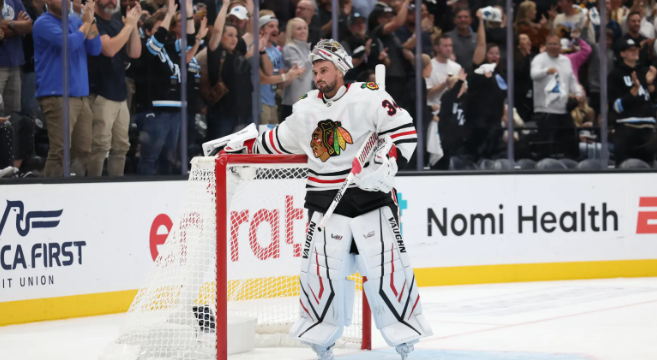The Chicago Blackhawks played better than the Utah Hockey Club but still lost 5-2 on Tuesday, highlighting that sometimes the superior team does not come out on top.
On certain nights, a goaltender can significantly influence the outcome of a game, while on others, a standout performance from a forward or defenseman can turn the tide. The Blackhawks have several key players who can make a difference, and for the team to achieve success this season, these three individuals will need to rise to the occasion.
**Three players crucial to the Chicago Blackhawks’ success:**
**Petr Mrazek**: Mrazek had a solid recovery season with the Blackhawks last year, posting a .907 save percentage and a 3.05 goals against average over 56 games. He consistently stood out as the top player on a struggling team, often keeping them competitive in tough matches. This was evident in the loss to Utah, where his efforts during critical moments prevented an even larger deficit, allowing the team to remain in contention. The Hawks will rely on Mrazek to shoulder most of the load until Laurent Brossoit is back from injury.
**Seth Jones**: Jones is a key figure on the Blackhawks’ defense, logging 26:42 minutes and contributing two shots on goal in the season opener against Utah. He assisted on the team’s first goal, demonstrating that getting the puck to star player Connor Bedard can lead to favorable outcomes. Jones is also responsible for leading the power play, spending 3:48 on the ice during those opportunities. For the Hawks to succeed, he needs to unleash his offensive skills and aim to replicate his first season in Chicago, where he tallied 51 points in 78 games.
**Connor Bedard**: Now in his second season, Bedard is no longer a rookie; he has become a player that teammates look to during high-pressure situations. Veterans like Tyler Bertuzzi and Teuvo Teravainen joined the Blackhawks to have the chance to play alongside him. As the team continues its rebuilding process, Bedard’s strong performance this season is crucial for progression. While he doesn’t have to be flawless—given that mistakes are part of taking creative risks—he will need to play smarter in his second year to help drive the team’s success.
